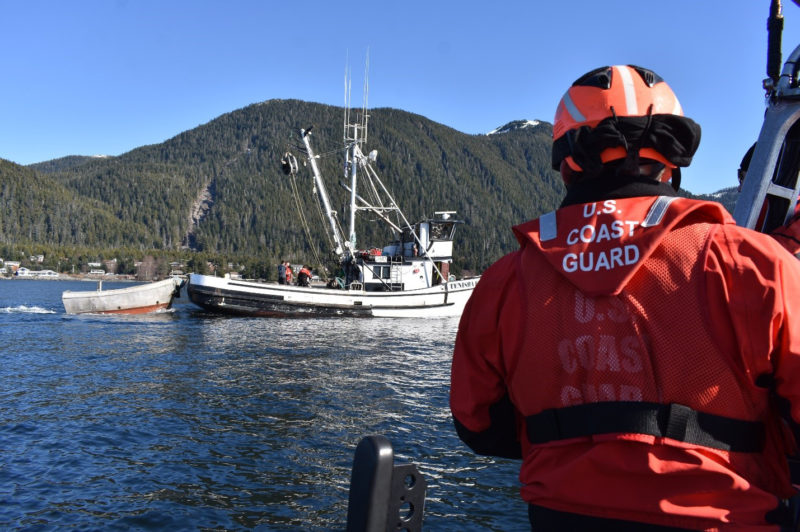Coast Guard officials in Alaska said their investigators and inspectors are seeing “a concerning trend in violations of maritime law throughout the state,” include a rising number of mariners testing positive for marijuana use and faulty lifesaving equipment on vessels.
In 2019 non-credentialed mariners who submitted to drug testing in the Coast Guard Sector Anchorage region came back with positive results in 15 percent of testing. The positive rate is increased this year to 22 percent from January to June, according to the Coast Guard.
Alaska has legalized recreational marijuana use, but its use is still prohibited for mariners on commercial vessels under state and federal law, while sale and possession remains illegal under federal law.
As more states and local governments move toward decriminalization and partial legalization, marijuana is a growing issue for the Coast Guard and maritime industries.
“Federally-credentialed mariners are prohibited at all times from using marijuana or being under its effect. For those applying for a Coast Guard mariner credential, the consequences of failing a drug test negatively impacts the application process with the National Maritime Center and could delay or preclude issuance of such credential,” the service warns.
Meanwhile, the Coast Guard’s Alaska Marine Safety Task Force inspectors are finding more unserviceable or missing life-saving equipment aboard commercial fishing vessels.
“From June 8 through 22, members of the task force removed 119 immersion suits during commercial fishing vessel exams in the King Salmon area because they were not in serviceable condition,” according to Coast Guard officials in Anchorage. Most were replaced with new ones by owners to get back in compliance, they said.
Other incidents reported by the Coast Guard included:
- A June 17 boarding by a team from the cutter Mellon that terminated a fishing vessel’s voyage for not having adequate immersion suits aboard.
- A Coast Guard senior investigating officer and an Investigative Services (CGIS) agent served a mariner passing through the Ted Stevens Anchorage International Airport with complaint for suspension/revocation. “He is one of numerous individuals being charged with misconduct for use of fraudulent documentation that led to issuance of a merchant mariner credential,” according to the Coast Guard.
- On May 18 a company was fined for operating a barge with an expired internal structural examination.
- On March 2 inspectors at Coast Guard Sector Juneau issued a $1,000 notice of violation to a local cargo operator for conducting bulk fuel transfers out of compliance with their certificate of inspection and bulk fuel permit.
Russel Hazlett, a commercial fishing vessel inspector with Coast Guard Sector Anchorage, said there “are not necessarily more safety violations than typical, the Coast Guard is simply taking a stronger enforcement posture.”
There are more fishing vessel accidents and investigations with the onset of spring and summer fisheries, and “safety violations and casualties increase as the season progresses due to complacency and fatigue.”
One trend accompanying the demands for covid-19 pandemic precautions has been more fishing vessel captains coming alone to the Bristol Bay region to ready their vessels for the salmon fishery, while their crews quarantined until ready to get underway, Hazlett said. Several previously scheduled safety drill instructor classes were cancelled as a precaution, he said.
The Coast Guard and allied groups like the Alaska Marine Safety Education Association are pushing out information to alert fishermen and mariners of the hazards this season, said Hazlett.
“We are constantly trying to get information out to the commercial fishing community. Our best resource is our web site www.fishsafewest.info for NW region or www.fishsafe.info for national,” he said. “We also work with NIOSH who compiles all our data and promotes safety programs towards particular hazards that trend or emerge as specific problems that need to be addressed www.cdc.gov/niosh/topics/fishing/ .”
AMSEA Director Jerry Dzugan said the uptick in marijuana positive tests is not surprising: “With legalization and even the abundance of cannabis use in the general population before legalization, it is not surprising to see an increase in positive test results.”
It’s not specific to the fishing industry, but part of a larger trend in the general population after legalization, Dzugan points out.
“Cannabis is fat soluble and can stay in the body in detectable amounts for weeks, it's crossing the testing time period from when it could have been used during off-fishing time,” said Dzugan. While it is hard to directly relate to occupational fishing time, a general rise in use across the general population after legalization “would seem to show a rise in most occupational groups.”




